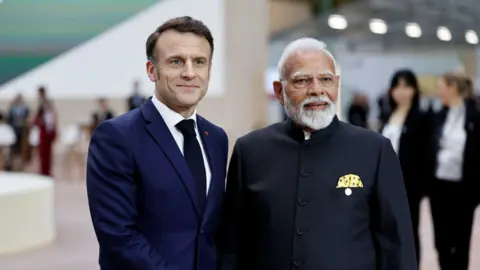India and France plan small modular nuclear reactors
 Reuters
ReutersIndia and France plan to work together on developing small modular nuclear reactors, India's foreign ministry said after Prime Minister Narendra Modi's visit to the country.
Modi and French President Emmanuel Macron emphasised the importance of nuclear energy for "strengthening energy security" and transitioning towards a "low-carbon economy".
It comes days after Delhi announced plans to change its strict nuclear liability law, which holds operators accountable for accidents or incidents and has been blamed for delays to previous nuclear projects.
Modi is also expected to discuss potential nuclear investments by US firms during his visit to Washington on Thursday.
India's foreign ministry said the Delhi and Paris would develop small modular reactors and advanced modular reactors for civil use.
Such reactors can be built in factories and transported to locations where they can be assembled and installed.
They do not require large tracts of land or extensive infrastructure and are significantly smaller than traditional nuclear reactors.
Indian Foreign Secretary Vikram Misri said the aim was to initiate "cooperation" as modular reactor technology was "still in its initial stages".
"We intend to be able to cooperate in co-designing the reactors, co-developing them and co-producing them, we feel this will allow us to tackle complications faced in other conventional projects," he said.
The proposed partnership signals a shift in India's nuclear energy policy.
Modi's government, previously known for strict regulation of nuclear power, appears to be opening up to greater international cooperation and private sector participation.
Finance Minister Nirmala Sitharaman unveiled ambitious nuclear energy targets earlier this month, setting a goal of generating 100GW of nuclear energy by 2047.
The government has promised more than $2bn (£1.6bn) for nuclear research and development, most of which will be used with the aim of developing five indigenous reactors by 2033.
The focus on small modular reactors also represents a shift in India's collaboration with France on nuclear power.
The countries had previously planned to build the world's biggest nuclear plant in India's western Maharashtra state.
The project has, however, been held up for more than a decade, mainly because of clauses introduced to India's nuclear liability law following accusations that India had previously let Western companies off the hook over the devastating 1984 gas leak from a pesticide factory in the city of Bhopal as well as concerns over nuclear safety in the wake of the Fukushima nuclear disaster in Japan.
Modi is currently in the US for a two-day visit where he will hold meetings with President Donald Trump and business leaders.
Earlier in the week, India's federal Oil Minister Hardeep Puri hinted that nuclear energy would be on the agenda for the two leaders.
On Tuesday, US Vice-President JD Vance met Modi on the sidelines of the AI Summit in Paris and discussed ways in which Washington could help Delhi diversify its energy sources by investing in American nuclear technology, news agencies reported quoting a White House statement.
Follow BBC News India on Instagram, YouTube, Twitter and Facebook.
